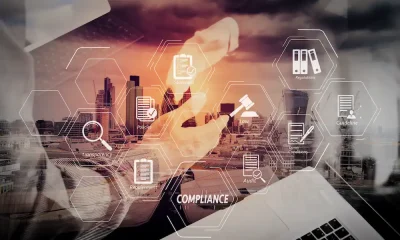Management
Significant Challenges For Businesses In 2023

Another year has flown by, and no matter what industry you work in, there will be highs and lows. 2023 is the year the world deals with a global recession and, in some regions, political uncertainty.
The Ukraine war continues to challenge nations to pick sides and think of safety; the future of globalization and the role of geopolitics is a new threat that touches businesses everywhere, from as far away as Australia and New Zealand to Asia, the UK, and the USA.
Plus, there are continuous threats to cybersecurity, the future of work, energy, food, and other crises. In another article, we look at job loss and the future of work, plus we have an article on where to next for globalization. Here we focus on threats businesses can work on to limit the disruption to operations, including:
- Data protection and cybersecurity
- Innovation
- Global remote work
Data Protection And Cybersecurity
There has been a shift in data protection in the past few years, putting much of the responsibility on businesses. GDPR changed the way companies deal with data, which represented a big challenge for international firms, and individual states now have their own regulations such as the California Consumer Privacy Act.
Data protection and cyber security will be critical, which is why it’s essential to use secure platforms and have an IT security policy for using BYOD (bring your own devices).
CyberThreats
Rising cyberattacks will continue to challenge everyone online. All sites and businesses must prioritize security to protect their systems from hackers.
A zero-trust approach to supply chain management, using PCI DSS for cardholder payments and if you’re considering cryptocurrency payments then CCSS is also recommended.
Innovation
Businesses are nervous about taking risks in the current economic climate, but innovation is important to keep your business relevant in today’s world. Changes such as embracing big data, creating more flexible work environments, and encouraging idea management are ways to innovate while still taking small steps at first.
Many businesses have already found that they are staying ahead of the game by being change agents and innovative over the past couple of years. For example, bringing forward their digital transformation process to better manage expenses and also reach more customers. Therefore, business owners must learn ways to stay innovative to ensure they aren’t left behind in the fast-paced business world.
Automation of jobs
It’s predicted that in this decade automation will affect a small percentage of jobs, estimated to be about 3% globally. However, within the next 10 to 15 years, that percentage could rise significantly as machines become capable of autonomy, so it’s something that all industries need to think about. By the mid-2030s, up to one-third of your workforce’s jobs may be automated. Is that something you want to embrace, or would you prefer to keep the human touch, even if it means falling behind the competition?
However, it is essential to note that automation and people can work together correctly. With a combination of the two, your business could have the best of both worlds without getting behind. Automation could take over jobs such as hiring and employee analytics. You could have your members of staff working in customer service instead, and stand out above the competition, simply because you have the human touch.
Global Workforces
More and more businesses now have employees based in several locations. A study by Upwork predicted that nearly 75% of teams across the world will have remote workers in the next decade, which could mean major cultural shifts. If remote work becomes the norm, there are some advantages to your business, including:
- A much larger pool of candidates to fill roles
- Potential salary savings as workers aren’t paying to commute
- Increasing employee productivity
- Boost in employee happiness
However, having a remote workforce does represent several challenges, such as making it difficult to encourage teamwork and ensure that people are at their most productive. Technology is making it easier to overcome these challenges, but in some cases, face-to-face work will still be needed.
Final Thoughts
No one predicted how far-reaching the impact of the Ukraine war has been on local economies and crises like food and fertilizer shortages.
Governments are putting the safety of their people first; hence Sweden and Finland set to join NATO, and the EU has given Ukraine EU candidate status. An uncertain global political climate puts fear in most businesses that lose confidence in consumer spending and predict lower revenue forecasts.
However, with foresight, businesses can be more strategic with investments and budgets. Plus, use their compliant marketing strategies to win over and retain customers.






